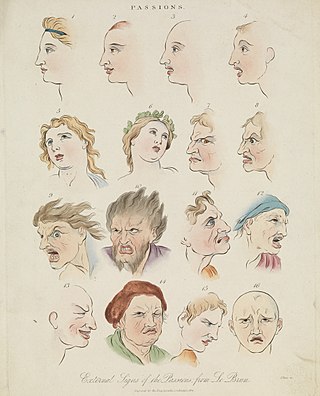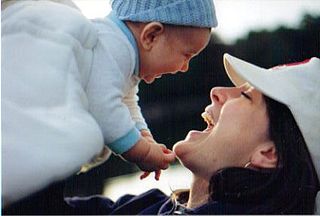
Emotions are mental states brought on by neurophysiological changes, variously associated with thoughts, feelings, behavioral responses, and a degree of pleasure or displeasure. There is no scientific consensus on a definition. Emotions are often intertwined with mood, temperament, personality, disposition, or creativity.

Psychology is an academic and applied discipline involving the scientific study of human mental functions and behavior. Occasionally, in addition or opposition to employing the scientific method, it also relies on symbolic interpretation and critical analysis, although these traditions have tended to be less pronounced than in other social sciences, such as sociology. Psychologists study phenomena such as perception, cognition, emotion, personality, behavior, and interpersonal relationships. Some, especially depth psychologists, also study the unconscious mind.

Empathy is the capacity to understand or feel what another person is experiencing from within their frame of reference, that is, the capacity to place oneself in another's position. Definitions of empathy encompass a broad range of social, cognitive, and emotional processes primarily concerned with understanding others. Types of empathy include cognitive empathy, emotional empathy, somatic empathy, and spiritual empathy.
In psychology, trait theory is an approach to the study of human personality. Trait theorists are primarily interested in the measurement of traits, which can be defined as habitual patterns of behavior, thought, and emotion. According to this perspective, traits are aspects of personality that are relatively stable over time, differ across individuals, are relatively consistent over situations, and influence behaviour. Traits are in contrast to states, which are more transitory dispositions.

Social cognition is a topic within psychology that focuses on how people process, store, and apply information about other people and social situations. It focuses on the role that cognitive processes play in social interactions.

Arousal is the physiological and psychological state of being awoken or of sense organs stimulated to a point of perception. It involves activation of the ascending reticular activating system (ARAS) in the brain, which mediates wakefulness, the autonomic nervous system, and the endocrine system, leading to increased heart rate and blood pressure and a condition of sensory alertness, desire, mobility, and reactivity.

Alexithymia, also called emotional blindness, is a neuropsychological phenomenon characterized by significant challenges in recognizing, expressing, and describing one's own emotions. It is associated with difficulties in attachment and interpersonal relations. While there is no scientific consensus on its classification as a personality trait, medical symptom, or mental disorder, alexithymia is highly prevalent among individuals with autism spectrum disorder (ASD), ranging from 50% to 85% of prevalence.
Mind-blindness, mindblindness or mind blindness is a theory initially proposed in 1990 that claims that all autistic people have a lack or developmental delay of theory of mind (ToM), meaning they are unable to attribute mental states to others. According to the theory, a lack of ToM is considered equivalent to a lack of both cognitive and affective empathy. In the context of the theory, mind-blindness implies being unable to predict behavior and attribute mental states including beliefs, desires, emotions, or intentions of other people. The mind-blindness theory asserts that children who delay in this development will often develop autism.

Affect, in psychology, refers to the underlying experience of feeling, emotion, attachment, or mood.
The dot-probe paradigm is a test used by cognitive psychologists to assess selective attention.

Richard S. Lazarus was an American psychologist who began rising to prominence in the 1960s. A Review of General Psychology survey, published in 2002, ranked Lazarus as the 80th most cited psychologist of the 20th century. He was well renowned for his theory of cognitive-mediational theory within emotion.
Appraisal theory is the theory in psychology that emotions are extracted from our evaluations of events that cause specific reactions in different people. Essentially, our appraisal of a situation causes an emotional, or affective, response that is going to be based on that appraisal. An example of this is going on a first date. If the date is perceived as positive, one might feel happiness, joy, giddiness, excitement, and/or anticipation, because they have appraised this event as one that could have positive long-term effects, i.e. starting a new relationship, engagement, or even marriage. On the other hand, if the date is perceived negatively, then our emotions, as a result, might include dejection, sadness, emptiness, or fear. Reasoning and understanding of one's emotional reaction becomes important for future appraisals as well. The important aspect of the appraisal theory is that it accounts for individual variability in emotional reactions to the same event.
Affect displays are the verbal and non-verbal displays of affect (emotion). These displays can be through facial expressions, gestures and body language, volume and tone of voice, laughing, crying, etc. Affect displays can be altered or faked so one may appear one way, when they feel another. Affect can be conscious or non-conscious and can be discreet or obvious. The display of positive emotions, such as smiling, laughing, etc., is termed "positive affect", while the displays of more negative emotions, such as crying and tense gestures, is respectively termed "negative affect".
Klaus Rainer Scherer is former Professor of Psychology and director of the Swiss Center for Affective Sciences in Geneva. He is a specialist in the psychology of emotion. He is known for editing the Handbook of Affective Sciences and several other influential articles on emotions, expression, personality and music.

Emotion classification, the means by which one may distinguish or contrast one emotion from another, is a contested issue in emotion research and in affective science. Researchers have approached the classification of emotions from one of two fundamental viewpoints:
- that emotions are discrete and fundamentally different constructs
- that emotions can be characterized on a dimensional basis in groupings
Paula M. Niedenthal is a social psychologist currently working as a professor of psychology at the University of Wisconsin–Madison. She also completed her undergraduate studies at the University of Wisconsin at Madison where she received a Bachelor's in Psychology. She then received her Ph.D. at the University of Michigan before becoming a faculty member of the departments of Psychology at Johns Hopkins University and Indiana University. Until recently, she served as the Director of Research in the National Centre for Scientific Research at the Université Blaise Pascal in Clermont-Ferrand France. The majority of Niedenthal's research focuses on several levels of analysis of emotional processes, this would include emotion-cognition interaction and representational models of emotion. Niedenthal has authored more than 80 articles and chapters, and several books. Niedenthal is a fellow of the Society for Personality and Social Psychology.
Cognitive appraisal is the subjective interpretation made by an individual to stimuli in the environment. It is a component in a variety of theories relating to stress, mental health, coping, and emotion. It is most notably used in the transactional model of stress and coping, introduced in a 1984 publication by Richard Lazarus and Susan Folkman. In this theory, cognitive appraisal is defined as the way in which an individual responds to and interprets stressors in life. A variety of mental disorders have been observed as having abnormal patterns of cognitive appraisal in those affected by the disorder. Other work has detailed how personality can influence the way in which individuals cognitively appraise a situation.
Emotional intelligence (EI) involves using cognitive and emotional abilities to function in interpersonal relationships, social groups as well as manage one's emotional states. It consists of abilities such as social cognition, empathy and also reasoning about the emotions of others.
A functional account of emotions posits that emotions facilitate adaptive responses to environmental challenges. In other words, emotions are systems that respond to environmental input, such as a social or physical challenge, and produce adaptive output, such as a particular behavior. Under such accounts, emotions can manifest in maladaptive feelings and behaviors, but they are largely beneficial insofar as they inform and prepare individuals to respond to environmental challenges, and play a crucial role in structuring social interactions and relationships.
Epistemic motivation is the desire to develop and maintain a rich and thorough understanding of a situation, utilizing one's beliefs towards knowledge and the process of building knowledge. A learner's motivation towards knowledge as an object influences their knowledge acquisition. In interpersonal relations, epistemic motivation is the desire to process information thoroughly, and thus grasp the meaning behind other people's emotions. In group settings, epistemic motivation can be defined as participants' willingness to expend effort to achieve a thorough, rich, and accurate understanding of the world, including the group task, or decision problem at hand, and the degree to which group members tend to systematically process and disseminate information.
Eysenck, M. W., & Fajkowska, M. (2018). Anxiety and depression: toward overlapping and distinctive features. Cognition & Emotion, 32, 1391–1400.
Oatley, K., Parrott, W. G., Smith, C., & Watts, F. (2011). Cognition and emotion over twenty-five years. Cognition & Emotion, 25(8), 1341–1348.
Hütter, M., & Rothermund, K. (2020). Automatic processes in evaluative learning. Cognition & Emotion, 34, 1-20.
Koole, S. L., & Rothermund, K. (2019). Revisiting the past and back to the future: Horizons of cognition and emotion research. Cognition & Emotion, 33, 1–7.
Leventhal, H., & Scherer, K. (1987). The relationship of emotion to cognition: A functional approach to a semantic controversy. Cognition & Emotion, 1, 3-28.
Luminet, O., Nielson, K. A., & Ridout, N. (2021). Having no words for feelings: alexithymia as a fundamental personality dimension at the interface of cognition and emotion. Cognition & Emotion, 35, 435–448.
Rothermund, K., & Koole, S. L. (2018). Three decades of Cognition & Emotion: A brief review of past highlights and future prospects. Cognition & Emotion, 32(1), 1–12.
Rothermund, K., & Koole, S. L. (2020). Rethinking emotion science: new theory section for Cognition & Emotion. Cognition & Emotion, 34, 628–632.
Van Kleef, G. A., & Fischer, A. H. (2016). Emotional collectives: How groups shape emotions and emotions shape groups. Cognition & Emotion, 30, 3–19. Chicago






